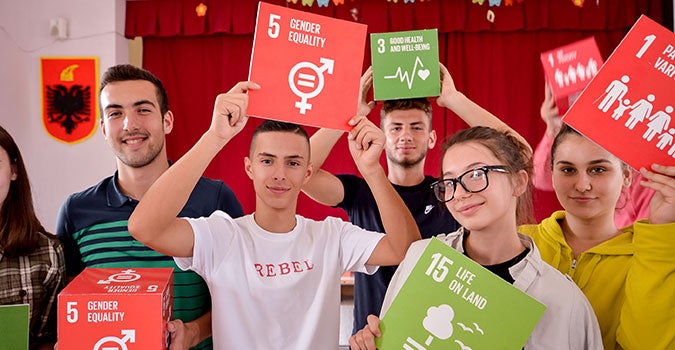
Sustainable Development Goals

On 1 January 2016, the 17 Sustainable Development Goals (SDGs) of the 2030 Agenda for Sustainable Development, officially came into force. The new agenda is an action plan for people, planet, prosperity, peace and partnership. It will foster peaceful, just and inclusive societies and require the participation of all countries, stakeholders and people. The ambitious agenda seeks to end poverty by 2030 and promote shared economic prosperity, social development and environmental protection for all countries. The new agenda is based on 17 goals, including a stand-alone goal on gender equality and the empowerment of women and girls (SDG 5) as well as gender-sensitive targets in other goals.
This is the first development agenda that has been negotiated by all Member States and that is applicable to all for the next 15 years. The outcome reiterates national ownership and leadership in the implementation of the agenda.
The Government of Albania is fully committed to implementing Agenda 2030 in the context of the National Strategy for Development and Integration (NSDI) and the European integration process. The Albanian Parliament unanimously passed a resolution on commitment to Agenda 2030 and the SDGs, outlining their commitment to promoting, financing and monitoring achievement of the SDGs and its positive relationship to EU integration.
Albania has presented its Voluntary National Review on Sustainable Development Goals, a report which outlines Albania’s path towards achieving Agenda 2030 and SDGs. It includes factual data on the achievement of targets and indicators, as well as reflections on what steps should be taken to achieve the Global Goals by the set deadline.
With SDG5, Agenda 2030 represents a major step forward in terms of the global commitment to gender equality, and—just as importantly—gender equality will be necessary to reach all the SDGs. Gender statistics are essential for monitoring achievement of the goals, especially the need to ensure no one is left behind. The National Institute of Statistics in Albania (NSTAT) has mapped existing data to SDG reporting requirements, showing that just over one-third (38 per cent) of the indicators are currently available. The remaining indicators require the introduction of new collection activities, new technologies and improved statistical methodologies for them to be produced.